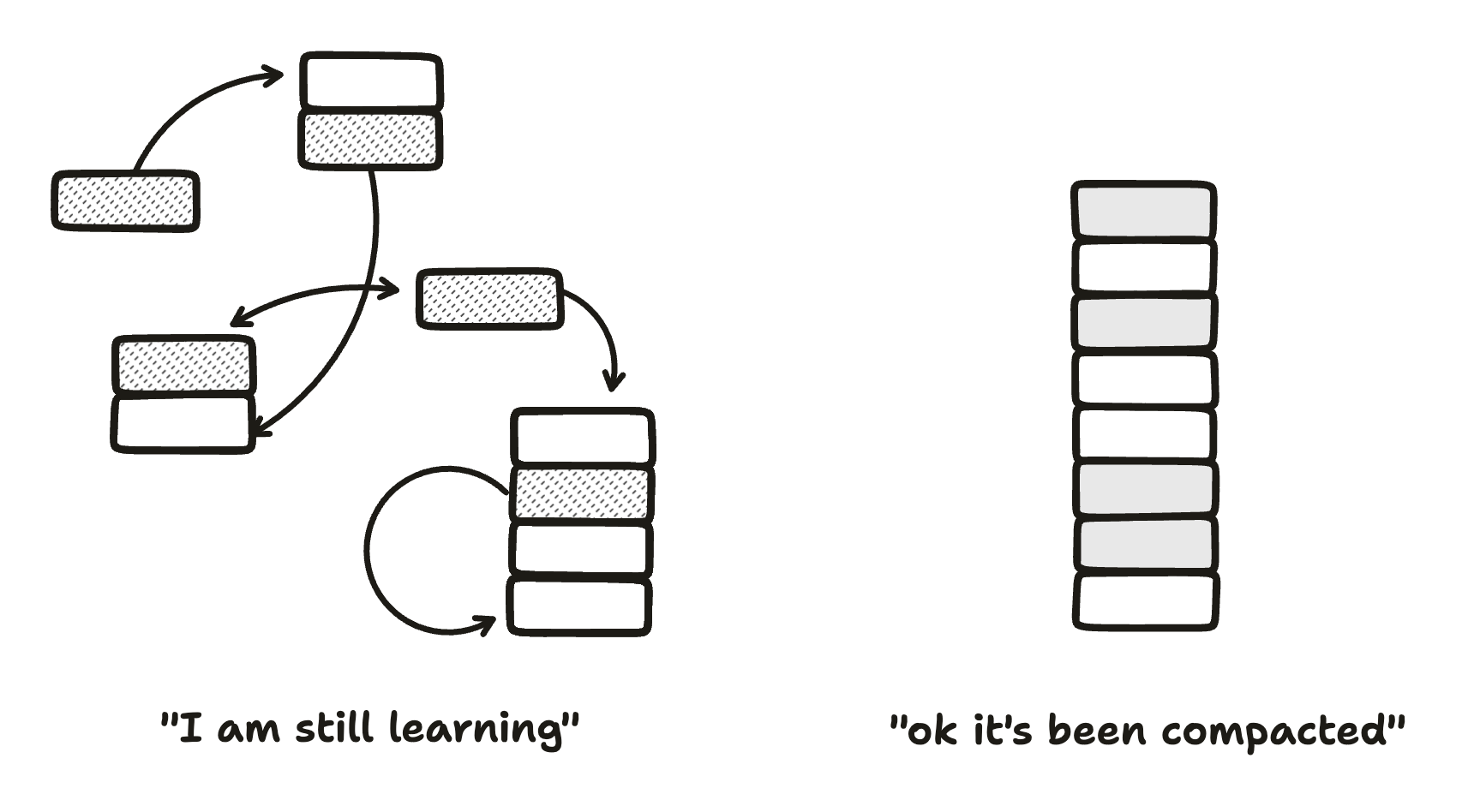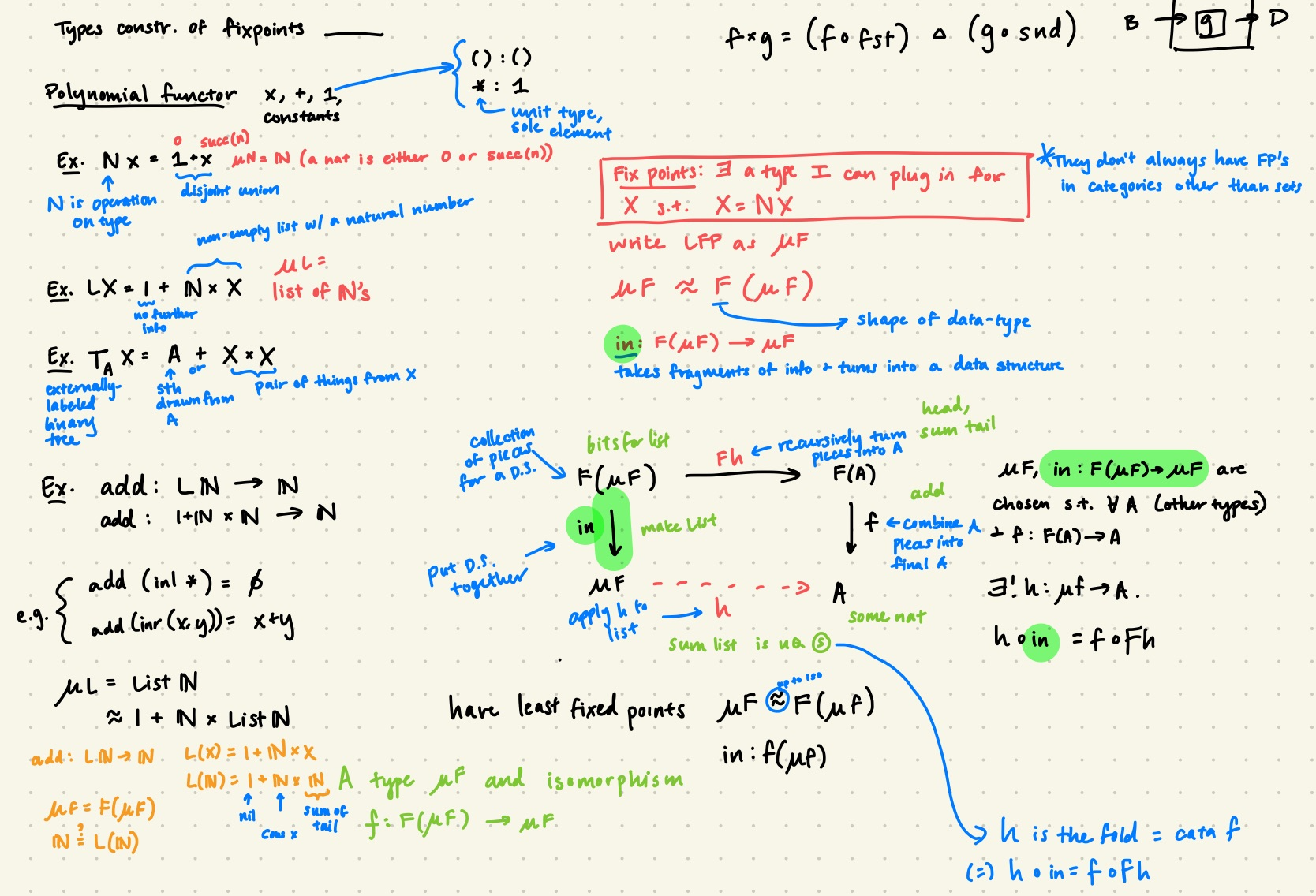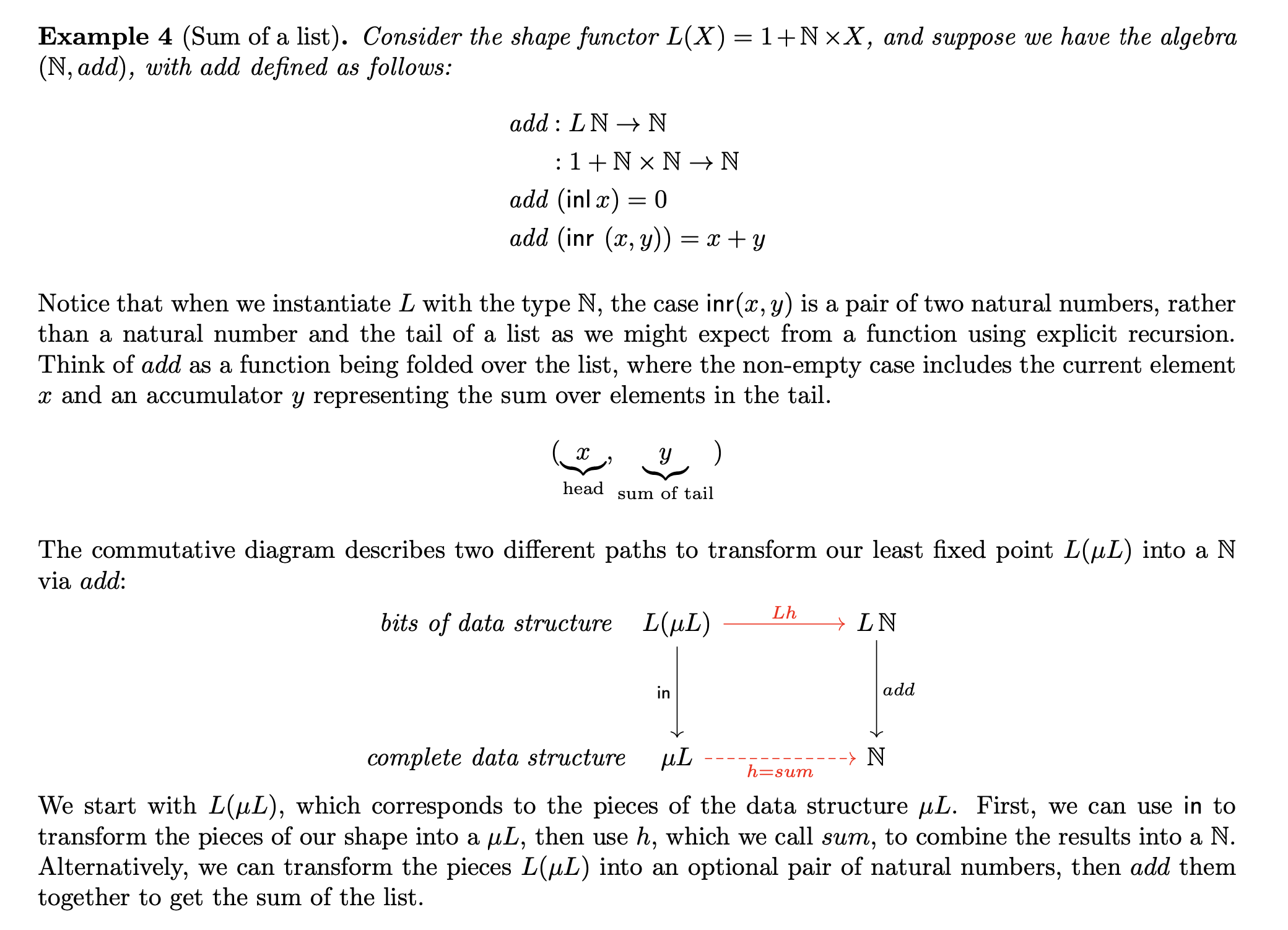The unreasonable effectiveness of chaotic knowledge acquisition
I used to conceptualize learning as a rigid progression from inchoate concepts floating around in my head (visual: crazy heap indirection) to some deeper understanding, organized and schematized with all my other knowledge (visual: neat C-style enum representation).

This two-phase division arises repeatedly throughout my learning process:
-
In my notes: I have a “messy buffer” filled with annotations and arrows and marginalia in six colors. Aspirationally, all of this information eventually lands in a “neat buffer” consisting of either clear ed PDF notes, or tidily handwritten pages with meaningful use of color and spatial arrangement.
-
In time allocation: I have “ingestion mode” where I write down as much as I can (into the messy buffer) in order to keep up, then “digestion mode” where I go back and slowly work through the messy buffer to figure out what everything means, form all the relevant schematic connections, and produce the neat buffer for posterity.
-
In self-assessment: I recently noticed that I feel comfortable saying I “know” something if and only if I’ve finished “digestion mode,” meaning I’ve produced a retrievable neat buffer somewhere—even if I don’t remember any of the material off the top of my head. Conversely, if I just sat through a bunch of lectures and discussions on concept and haven’t had time to digest, I will always tell you that I don’t “know” .
The messy/neat bifurcation is hardly new, especially when it comes to note-taking. But recently I’ve noticed some inadequacies of this framing, with interesting metacognitive implications.
🔗 Realization #1: Sometimes the messy notes are more useful
Theoretically, the messy buffer is supposed to function as a temporary holding area, a place to stash the incoming deluge of bits for future digestion. The neat version of my notes form the “archival version,” if you will—the copy I plan to reference years to come, when I need to page an idea back into memory.
Yet I’ve often found myself returning to the messy notes, even years later, over their neatly typeset counterparts. Something about the multicolor chaos and scribbles carries additional information that’s lost in the transition to . With the latter, I end up heavily exercising my (grossly overtaxed) reading comprehension muscles in order to deserialize all those perfect symbols and prose back into something my brain can actually manipulate. By comparison, the messy version feels closer to my brain’s native representation.


In this regard, typesetting my notes often serves as more of a finger exercise or summative assessment than an inherently-productive milestone. This was not always obvious to me! In my area of computer science, there’s a certain unspoken assumption that ideas aren’t “official” until they are properly typeset. (True maestros develop incredibly impressive setups for live note-taking in ; I remain in awe of their prowess.) For a long time I bought into the idea that a beautifully typeset PDF was the apogee of knowledge production. But increasingly I find myself referencing my scribbles instead, where seemingly all the information content lies in the marginalia.
🔗 Realization #2: I know a lot of things I haven’t consciously digested
One might think that ingestion is meaningless on its own, per the aphorism “in one ear and out the other.” Yet when I reflect on my own learning, the overwhelming majority of concepts never reach digestion. To be sure, I always tell myself (and others!) I’m going to take another slow pass through the chapter and re-watch all the lectures, but this is the intellectual equivalent of buying a gym membership on January 1. The problem isn’t even motivation—I almost always have a strong intrinsic desire to properly learn the material in question, but in reality I have the executive function of a pigeon who has suffered a non-lethal window crash, and so inevitably all my best-laid intentions get pushed further and further down the docket until they fall away to fester in some accursed cognitive parking lot that will never bear witness to the lights of new urbanism (dense, walkable, interconnected conceptual schema).
And yet, from this suburban graveyard, this veritable chop-shop of bicycles for the mind, a heartening paradox arises: I somehow know a lot more than I think I do.
I’d guess that I properly digest at most 1%, probably much closer to 0.1%, of all the information I encounter and consider interesting/desirable knowledge. By my own self-assessment, I can only claim to “know” that 0.1-1%. But somehow I feel like my percentage of “useful” knowledge—transferrable ideas, not just memorized definitions—is much closer to 5%, perhaps? Within that delta lies all of the concepts that piqued my interest at some point, that I swore I’d study but never did, but that I somehow find myself incorporating fluidly months or years later, in a way that passes expert scrutiny (modulo terminology).
Examples off the top of my head: the transitive closure of a binary relation, deforestation in programming languages, matroids as a generalization of linear independence, how to skate a one-foot glide on ice. All of these were concepts I encountered at some point and never properly absorbed (for lack of time or attention), until one day I invoked the concept without thinking very hard, and realized I understood it well enough to perform near (or far!) transfer.
There’s also a distinct, but related version of this “passive learning” phenomenon, which I frequently experience as follows:
-
I’m in a seminar, and someone introduces a concept. It sounds interesting, so I make a note to go over it later, and follow the rest of the talk at the level of vibes only.
-
Surprising no one, I do not end up going back over the concept; if you ask me to explain it three months later, I will tell you “I meant to look into this after watching a talk but I never got around to it so I really don’t know.”
-
Two months later, someone will reference the concept in an unrelated conversation, and I’ll instantly feel a sense of greater intellectual familiarity and comfort than would ever be rationally merited. (Often this “familiarity buff” causes me to retain more of the second conversation, catalyzing a positive feedback loop in my overall learning trajectory.)
This particular mashup of mere exposure and Baader–Meinhof is not quite as potent as the preceding examples insofar as it’s mostly limited to recognition instead of recall, but I’ve found that lots of people have experienced a similar phenomenon, making it a useful reference point when describing the surprising effectiveness of messy or superficial learning.
Though it speaks more to the extent of my neuroticism than anything else, the following unintuitive realization has provided me with untold succor:
I am capable of integrating serious knowledge without a formal “digestive” phase.
I used to believe that if I never made the time to properly work through a concept, all of that knowledge was lost to me approximately forever. Repeatedly failing to marshal the time and focus for “deep study” made me feel terrible, as if I were wasting or spurning the very insights I’d professed to desire! By contrast, it provides immense comfort to know there’s some background process in my head, diligently working to incorporate disjointed syntax into something with robust meaning. Specifically, this realization has made me (1) way less panicky about missing out on information, because I have faith it will re-emerge when the time is right, and (2) much more appreciative of my brain doing its best, even when I’m deeply frustrated with my own cognitive limitations.
🔗 Ok so?
Increasingly I’ve come to recognize that messy thought serves not only as preparation for neat thought, but has learning value unto itself for me, and neat thought processes—while satisfying—are not always a prerequisite for proper understanding. For me, this implies the the following corollaries:
-
If someone asks for help understanding a parked concept, or if I re-encounter something in my own exploration, I shouldn’t immediately retreat simply because I haven’t had time to digest the prerequisites. It’s important to communicate my uncertainty and lack of expertise, particularly with collaborators, but I can try to make sense of things anyway; often this yields more fruit than my dessicated hopes might expect.
-
At any point in time, I know more than I think I do. For example, I probably could not formally define a planar graph without stopping to think (assuming “the edges don’t have to cross!” doesn’t count), but I certainly have enough intuition for the associated applications and encodings to be useful in my own original thought. This has been a fairly persuasive (though not foolproof) rejoinder to my self-inflicted impostor syndrome.
-
Don’t throw away the bad notes/scratch; they’re often useful for reconstructing my understanding, even though my perfectionism may attach shame or some other weird moralistic valence to their incomplete form.
-
is not the telos. Far transfer is the telos.